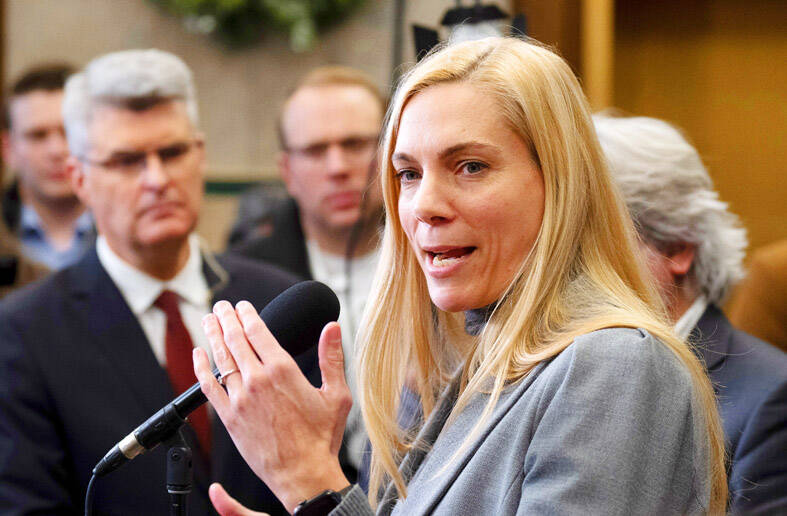Canada’s print media is to receive nearly two-thirds of an annual C$100 million (US$74.64 million) payment from Google to the country’s news outlets in exchange for distribution of their content, the federal government announced on Friday.
At the end of last month, after months of negotiations, Ottawa and Google announced a “historic” agreement, in which the tech giant would pay Canadian media companies compensation for the loss of advertising revenue.
“The share that television and radio will receive is capped at 30 percent, that of CBC/Radio-Canada [Canadian Broadcasting Corp] at 7 percent, which leaves the remaining 63 percent for the written press,” a federal official told journalists at a briefing.

Photo: AP
Most of the payout would go to the print media because it is “really dependent” on online platforms to distribute its content, the official added.
“Canada has accomplished something historic,” Minister of Canadian Heritage Pascale St-Onge told reporters, adding that “newsrooms are experiencing a crisis which affects journalism, a foundation of our democracy.”
“As part of the deal, Google provided assurances that Canadian news outlets will be treated fairly in comparison with deals it might strike with news media in other countries,” Radio Canada International reported on Friday.
“The federal government said that if news outlets in other countries strike a better deal with Google, the company would go back to the federal government with a view to resolving any concerns,” it added.
The agreement between Canada and Google is part of the Online News Act, which aims to support the struggling Canadian news sector, which has seen a flight of advertising dollars and hundreds of publications closed in the past decade.
The deal goes into effect on Tuesday.
Facebook’s parent company, Meta, which is also affected by the new legislation, still opposes the text, which it called “fundamentally flawed.”
“We will continue to push Meta, that makes billions of dollars in profits, even though it is refusing to invest in the journalistic rigor and stability of the media,” Canadian Prime Minister Justin Trudeau told reporters in Vancouver.
Meta said it will stick to its decision.
“News outlets choose to use our free services because it helps their bottom line, and today’s release of final regulations does not change our business decision,” said Rachel Curran, head of public policy for Meta Canada.
Since Aug. 1, Facebook and Instagram have blocked news content in Canada to avoid having to compensate media companies.
St-Onge said the Canadian Radio-television and Telecommunications Commission would “pay close attention to Facebook and Meta” as part of its enforcement.
Additional reporting by Reuters and staff writer

The US government has signed defense cooperation agreements with Japan and the Philippines to boost the deterrence capabilities of countries in the first island chain, a report by the National Security Bureau (NSB) showed. The main countries on the first island chain include the two nations and Taiwan. The bureau is to present the report at a meeting of the legislature’s Foreign Affairs and National Defense Committee tomorrow. The US military has deployed Typhon missile systems to Japan’s Yamaguchi Prefecture and Zambales province in the Philippines during their joint military exercises. It has also installed NMESIS anti-ship systems in Japan’s Okinawa

TRAGEDY STRIKES TAIPEI: The suspect died after falling off a building after he threw smoke grenades into Taipei Main Station and went on a killing spree in Zhongshan A 27-year-old suspect allegedly threw smoke grenades in Taipei Main Station and then proceeded to Zhongshan MRT Station in a random killing spree that resulted in the death of the suspect and two other civilians, and seven injured, including one in critical condition, as of press time last night. The suspect, identified as a man surnamed Chang Wen (張文), allegedly began the attack at Taipei Main Station, the Taipei Fire Department said, adding that it received a report at 5:24pm that smoke grenades had been thrown in the station. One man in his 50s was rushed to hospital after a cardiac arrest

ON ALERT: Taiwan’s partners would issue warnings if China attempted to use Interpol to target Taiwanese, and the global body has mechanisms to prevent it, an official said China has stationed two to four people specializing in Taiwan affairs at its embassies in several democratic countries to monitor and harass Taiwanese, actions that the host nations would not tolerate, National Security Bureau (NSB) Director-General Tsai Ming-yen (蔡明彥) said yesterday. Tsai made the comments at a meeting of the legislature’s Foreign Affairs and National Defense Committee, which asked him and Minister of National Defense Wellington Koo (顧立雄) to report on potential conflicts in the Taiwan Strait and military preparedness. Democratic Progressive Party (DPP) Legislator Michelle Lin (林楚茵) expressed concern that Beijing has posted personnel from China’s Taiwan Affairs Office to its

‘ILLEGAL RULING’: The KMT and the TPP slammed the Constitutional Court judgement, saying it contravened the law and was trying to clear the way for a ‘green dictatorship’ The Constitutional Court yesterday ruled that amendments to the Constitutional Court Procedure Act (憲法訴訟法) passed by the Legislative Yuan last year are unconstitutional, as they contravene due legislative process and separation of powers. The Legislative Yuan on Dec. 20 last year passed amendments stipulating that no fewer than 10 grand justices must take part in deliberations of the Constitutional Court, and at least nine grand justices must agree to declare a law unconstitutional. The Executive Yuan on Jan. 2 requested that lawmakers reconsider the bill, but the Legislative Yuan, under a combined majority of Chinese Nationalist Party (KMT) and Taiwan People’s Party